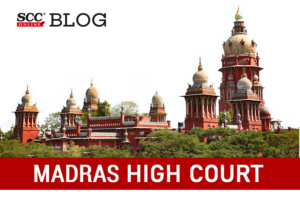Madras High Court: In a writ petition filed against the order of Central Administrative Tribunal, the division bench of V.M. Velumani and R. Hemalatha*, JJ. held that the petitioner has erred in making a claim that there was no approval for the issuance of charge memo. The Central Administrative Tribunal was right in holding that the petitioner’s case had no merits.
In the case at hand, the petitioner joined the Customs Department as Appraising Officer in 1993 and was promoted to Indian Revenue Service in the year 2003. In 2009, he was issued with a charge memo prior to which he was placed under suspension. There were two charges against him one pertaining to unauthorised absence from duty from 05-01-2007 and the second one pertaining to observing hunger strike in his native town for seven days from 03-02-2009 to 90-02-2009 in support of Sri Lankan Tamils and for writing a letter to the President of All India Congress Party criticizing the policies of the Congress Government especially regarding the Indo-Sri Lankan Peace Accord. Later, after inquiry, an order was issued inflicting the penalty of pay-reduction by three stages for a period of three years.
The petitioner’s representation addressed to the President of India did not yield any response and his subsequent representation citing certain procedural lapses on the part of the employer were not responded. In the meanwhile, the petitioner had also obtained certain information under Right to Information (‘RTI’) based on which he had approached the Central Administrative Tribunal in which a miscellaneous application was filed for condonation of delay. The delay was condoned. However, the original application was dismissed as devoid of merits. This is the subject-matter in the instant writ petition.
The Court after scrutiny of all the relevant records presented and relied upon by both the sides, said that it is abundantly clear that the petitioner did not raise any objection till the enquiry proceedings were over and even after he expressed his desire to opt for voluntary retirement in 2017. The petitioner had applied for resignation in 2009 at a time when the enquiry proceedings were pending and subsequently his application for voluntary retirement was made in 2017 when he had received a second charge memo for certain alleged lapses. The Conduct Rules of any Government servant clearly prohibit being a member of any political party or openly expressing support or opposing any Government Policies. It is true that the petitioner showed his empathy towards his fellow Srilankan Tamil crisis, but as a Government servant he ought to have restrained himself in expressing his opinion.
The Court further said that the petitioner has not denied the misconduct. Therefore, after having accepted the punishment awarded to him and also, having undergone the financial implication of the said punishment, the petitioner has come up with another issue challenging the first charge memo issued in 2009.
The respondents had clearly substantiated that the finance minister as the competent authority had approved of the initiation of disciplinary proceedings for major penalty under Rule 14 of Central Civil Services (Classification, Control and Appeal) Rules 1965 in which the draft charge memo was also approved. Therefore, there is no dispute as to whether approvals were obtained for initiation of disciplinary proceedings and issuance of charge memo.
Thus, the Court held that the petitioner has erred in making a claim that there was no approval for the issuance of charge memo. The Central Administrative Tribunal was right in holding that the petitioner’s case had no merits.
*Order by: Justice R. Hemalatha.
[B. Balamurugan v The Secretary, 2023 SCC OnLine Mad 1530, decided on 10-03-2023]
Advocates who appeared in this case :
For Petitioner: B. Balamurugan, Party in Person;
For Respondents: Senior Panel Counsel V. Sundareswaran.

